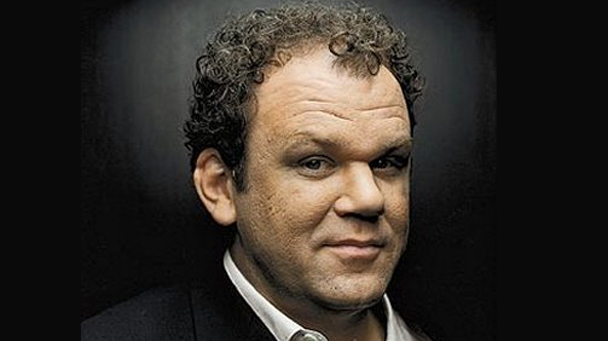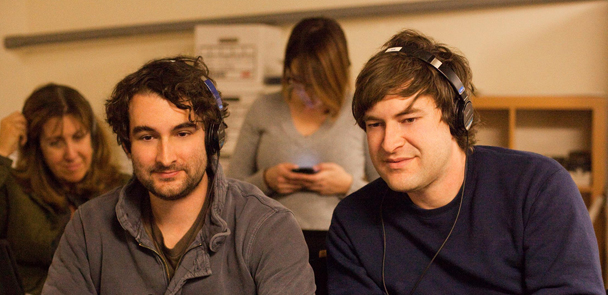John C Reilly and Jay Duplass
John C. Reilly sits down with writer and director Jay Duplass to talk improvisation, mumblecore and Cyrus.

With John’s social life at a standstill and his ex-wife about to get remarried, a down on his luck divorcee finally meets the woman of his dreams, only to discover she has another man in her life – her son. John C. Reilly sits down with writer and director Jay Duplass to talk improvisation, mumblecore and Cyrus.
Jay, what is it like working with your brother (Mark Duplass, co-writer and director of Cyrus)?
JD: I feel like everyone wants me to say that we go head to head and battle! I think the reason there are so many successful sibling teams is because it’s really hard to make a movie, and it’s almost impossible to make a really good movie – it happens rarely. For us, you set this thing in motion and it becomes this gigantic monster and it starts eating up money and threatening to not let you sleep. If you have someone by your side who shares your brain and your sense of humour and the way you see the world, it helps you manage the monster.
Cyrus is your first big Hollywood film. What was the biggest difference from what you have done before?
JD: We don’t have to make food and carry lights anymore! You have to explain what you’re doing and why you’re doing it a lot more to people who aren’t in the creative sphere – we wouldn’t explain it to John the way we would explain it to a studio or investor. The other thing is dealing with the hordes of people, a union crew, we pushed everyone off-set so when we rolled takes, it was the actors and the camera operators in the room.
Can I ask you both about the improvisation process on set?
JD: We don’t do any rehearsals and we prefer not to direct the first take if the actors are comfortable. We feel like we hire them for very specific reasons, because they are intelligent and they understand the characters and we also like to be surprised. Actors are always going to have an idea of what they want to do and it’s great to let them do that. Even if we go a different way it’s important to let people express what they want to express.
JCR: I had a lot of leeway. These guys wrote a great script and then we were encouraged not to use it! But we used it as a blueprint. Every time I went off in some direction they were always delighted. They loved being surprised and our honest reactions to things. Most days I felt like I had too much freedom – I would say, “What do you want to happen?” and they would tell me to follow my instincts. I said, “My instinct is to do what you want me to do!” Sometimes you feel brave and creative and full of ideas, and sometimes you’re just terrified.
Jay, was it important for you and Mark that Cyrus wasn’t an out-an-out villain?
JD: We don’t really judge any of our characters. Cyrus is definitely the most extreme character we’ve created, but at the heart of it, this is a kid who has one significant relationship in his life and if he loses it, he will totally be at sea. That is something that Jonah always had at the forefront of his performance.
Was Jonah Hill a very surprising person to improvise with?
JCR: That was the easiest part of it for me. He’s such a clever and funny actor, and he can go toe to toe on the improvisation. Moments I felt more at sea were in the relationship scenes with Marisa (Tomei). I am a modest person so I felt a little more in need to direction.
How did working with the ‘Duplass method’ compare to the improvisation work you’ve done with Will Ferrell?
JCR: We do a lot of variations of things when Will and I work together, mainly riffing off the same idea and finding funny ways to say the same thing. Generally the plot doesn’t change. On Cyrus there was often a bewildering world of options – I could literally say anything. Because we were working in chronological order, they said we could even change the plot of the movie. You’re used to relying on certain things as an actor.
Was that liberating?
JCR: It was and I think it made for a really original and emotionally authentic film.
Is there an added pressure to be funny?
JCR: With Will, the super-objective when you’re working on a big comedy is ‘make it funny’. That was the great luxury with Cyrus, it could go anywhere – it didn’t matter if it ended up being kind of sad or awkward, anything was fine as long as it was truthful. That’s the great asset that Jay and Mark bring, is their dogged pursuit of the truth. People the term ‘mumblecore’ for this group of filmmakers, it’s really a derogative term I think. First of all, there’s very little mumbling! It’s almost like an American Dogma – everyone just got sick of artificial stories and contrived movies. Mark and Jay would say, “Don’t do that, it seems like something that would happen in a movie”.
JD: I just realised how ridiculous that sounds to say that on a movie set but that is what we say.
John, would it be fair to say you have made a shift from drama to comedy?
JCR: I just made a film called We Need To Talk About Kevin, which is not a comedy at all. I just try to keep employed. For whatever reason, over the past couple of years, some of the most interesting people in film are people making comedies. Will Ferrell and Adam McKay are really smart, subversive guys. Judd Apatow is one of the smartest people making movies right now. I wish I could say I had some master plan but the truth is, somebody invited me to come play and I said sure.

How did the character of John initially speak to you?
JCR: I had seen Puff Chair and my wife had met Jay and Mark at a film festival said I would love them. Word got back to them and then six months later they had written the script for me. I wish I could say that happened all the time. They said: “We wrote this part for you, if you want it we would be so excited, if you don’t, we’re not going to make this movie – no pressure!” I thought, they wrote this part for me, I wonder who it is. Oh, it’s a pathetic, seven-year divorced, loner who is masturbating – this is me, only I could be this guy.
Was there anything in the film that you felt uncomfortable about doing or did you push to make it more awkward?
JCR: There was enough awkwardness – I didn’t have to push for any more! Starting off the film with your pants down is about as awkward as it gets. I think the jock strap was my idea…
So that was the first scene you shot?
JCR: I have to say, that was one of those moments where you think, ‘I have a weird job, this is a strange thing to be doing’. The truth is I am as committed to honesty in film as Jay and Mark, and that is what I signed up for. I wasn’t going to go in one day and say, “Can we do one with the pants up?” You needed to find the guy at the depth of his misery.
Was it easy for you to identify with your character?
JCR: I’m much luckier in love than poor John has been, I’ve been married for a long time and have a family, but that was one of the great joys of playing him – getting to play someone my age who wasn’t like a mental 12-year-old was a real pleasure. The guy has some real gravitas and he’s been through the ringer. A lot of the words are the way I would put things. We’re both romantics and I often meet people and start giving them my honest opinion, maybe too much information. I’m the kind of person who will come into a room, and if there’s an elephant in the room, I talk about the elephant!
Is it the most vulnerable you have felt playing someone?
JCR: It’s definitely up there. I tend to have a lot of vulnerable moments on-screen even when I am playing tough characters. Closed characters are not that interesting.
Would you go to a party and sing?
JCR: Sure, hopefully a lot better than I did in this movie! I am one for instigating dance parties, why not?
The Shrek line was apparently yours, is that true?
JCR: Yes. Well compared to most men I do look like Shrek. I don’t know why I said that, I almost immediately regretted it, but at the same time I thought, ‘Well that’s in the movie’. It wasn’t just in the movie it was in every trailer. Shrek’s a nice enough guy – he gets the girl too.
How important was it for you to develop a relationship with Marisa and Jonah before you started filming?
JCR: We were encouraged not to do anything, I think I said hello to Marisa when we met for the hair and make-up tests. What you see is what you get, as Marisa and I were getting to know each other in life it was almost virtually on the same timeline as the film. Jonah and I knew each other pretty well already, he was in Walk Hard (The Dewy Cox Story) with me and we had a lot of friends in common.
Jay, how was the casting process for you?
JD: Once John was on board, it was a process of worrying. You get him and then you think, ‘Uh-oh, how are we going to get a kid who can go head-to-head with him?’ We weren’t going to be creating their battle of wits through artifice or set pieces. When John and Jonah are at it against each other, there is an element of reality there. We knew Jonah a little and were excited to explore different sides of him. In a love triangle like this, the Molly character could recede and disappear, so we were looking for someone who was bold and would stand up for their character and Marisa has demonstrated that. She was excited to play a mom for the first time – a lot of women are scared to date themselves. We need personalities who are willing to jump off of cliffs to make our movies successful.
John, have your expectations of acting changed since you got into the business?
JCR: I just feel really lucky. From the beginning of my career, it has been a complete fluke that a person of my background has been able to do what I have. I hope people keep making good movies and putting me in them! I would like the world to come to a place where people go to the movies to be moved in a dramatic way again, people are usually drawn these days to laugh or be thrilled out of their own reality, to escape. It’s getting really hard to make good dramatic films Hollywood right now.









COMMENTS